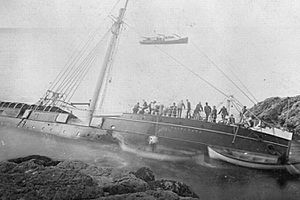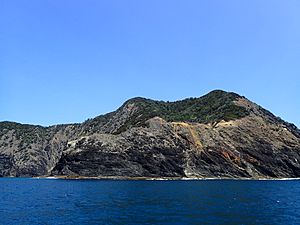SS Wairarapa facts for kids

The wreck of SS Wairarapa some days after the accident.
|
|
Quick facts for kids History |
|
|---|---|
| Name | Wairarapa |
| Namesake | Wairarapa |
| Owner | Union Steam Ship Company |
| Operator | Union Steam Ship Company |
| Route | Sydney-Auckland |
| Builder | William Denny and Brothers |
| Yard number | 259 |
| Launched | 19 May 1882 |
| Completed | 3 July 1882 |
| Out of service | 29 October 1894 |
| Homeport | Auckland |
| Fate | Wrecked off Miners Head |
| General characteristics | |
| Class and type | Luxury steamer |
| Type | Steel screw steamship |
| Tonnage | 1786 gross tons, 1023 net tons |
| Length | 285.2 ft |
| Beam | 36.3 ft |
| Draught | 23.7 ft |
| Speed | ~14 knots |
SS Wairarapa was a famous ship from the late 1800s in New Zealand. It traveled regularly between Auckland, New Zealand, and Australia. The ship became sadly famous when it crashed into a reef near Great Barrier Island, about 100 kilometers from Auckland, and sank. Around 130 people lost their lives, making it one of the biggest ship disasters in New Zealand's history. The ship was named after the Wairarapa region.
Contents
The Ship's Journey and Crash
Wairarapa was built in 1882 in Dumbarton, Scotland. It was made for the Union Steam Ship Company. Soon after it was launched, the ship sailed to New Zealand. It became one of the few fancy, comfortable steamers that traveled across the Tasman Sea to Australia.
The Wairarapa left Sydney, Australia on Wednesday, October 24, 1894. Its goal was the busy port city of Auckland, New Zealand, which was 2,000 miles away. Four days later, as the Wairarapa sailed around the top of New Zealand's North Island, thick fog and storms began.
However, Captain John S. McIntosh kept the ship moving fast, at nearly full speed (13 knots), even with the heavy fog. Sadly, the ship went off course. This might have been because of a compass that wasn't working right. At the official investigation later, some people even thought the ship was being steered by guessing its position, not by using a compass at all. Whatever the reason, the ship ended up sailing west of the Poor Knights Islands, instead of east. This meant it was much closer to the mainland than the crew thought.
At about 8 minutes past midnight on Monday, October 29, 1894, the ship crashed. It hit the steep cliffs near Miners Head on the northern tip of Great Barrier Island, off the coast of Auckland.
Surviving the Wreck
The hours after the crash were very difficult, and many lives were lost. A lot of passengers couldn't swim and drowned in the rough seas while trying to reach the shore. One life raft was seen floating away and was never found again.
Some people, including many of the crew, managed to get into lifeboats. Other lifeboats that were launched safely stayed near the sinking ship. They picked up survivors from the water whenever they could. A number of people climbed into the ship's rigging to escape the waves. Around 3 AM, Captain McIntosh jumped into the sea and was believed to have drowned.
One lifeboat eventually reached a local Ngati Wai Māori community at Katherine Bay. This kind community rescued and cared for many of the survivors. Among those who survived were a seaman, fisherman, and farmer named Mariano Vella and his new wife.
News Reaches Auckland
Even though the Wairarapa was expected in Auckland, no one knew where it might have crashed. At that time, the only way to contact Great Barrier Island was by a steamer that visited once a week. Because of this, it took three full days for the news of the shipwreck to reach Auckland.
The Northern Company's steamer Argyle arrived at Port FitzRoy on Wednesday, October 31. It took the survivors who had made it to Port FitzRoy on board. The steamer then went to the shipwreck site and to Katherine Bay, picking up more survivors. It finally arrived back in Auckland around 3 AM on Thursday, November 1.
After the Wairarapa disaster, an official investigation was held. It found that Captain McIntosh's actions were the main cause of the terrible accident.
Protecting the Wreck
The wreck of the Wairarapa is now protected. It is listed for preservation in the Auckland Unitary Plan. It is also protected by the archaeological rules of the Heritage New Zealand Pouhere Taonga Act 2014. This helps make sure the site is preserved for the future.
 | Isaac Myers |
 | D. Hamilton Jackson |
 | A. Philip Randolph |


